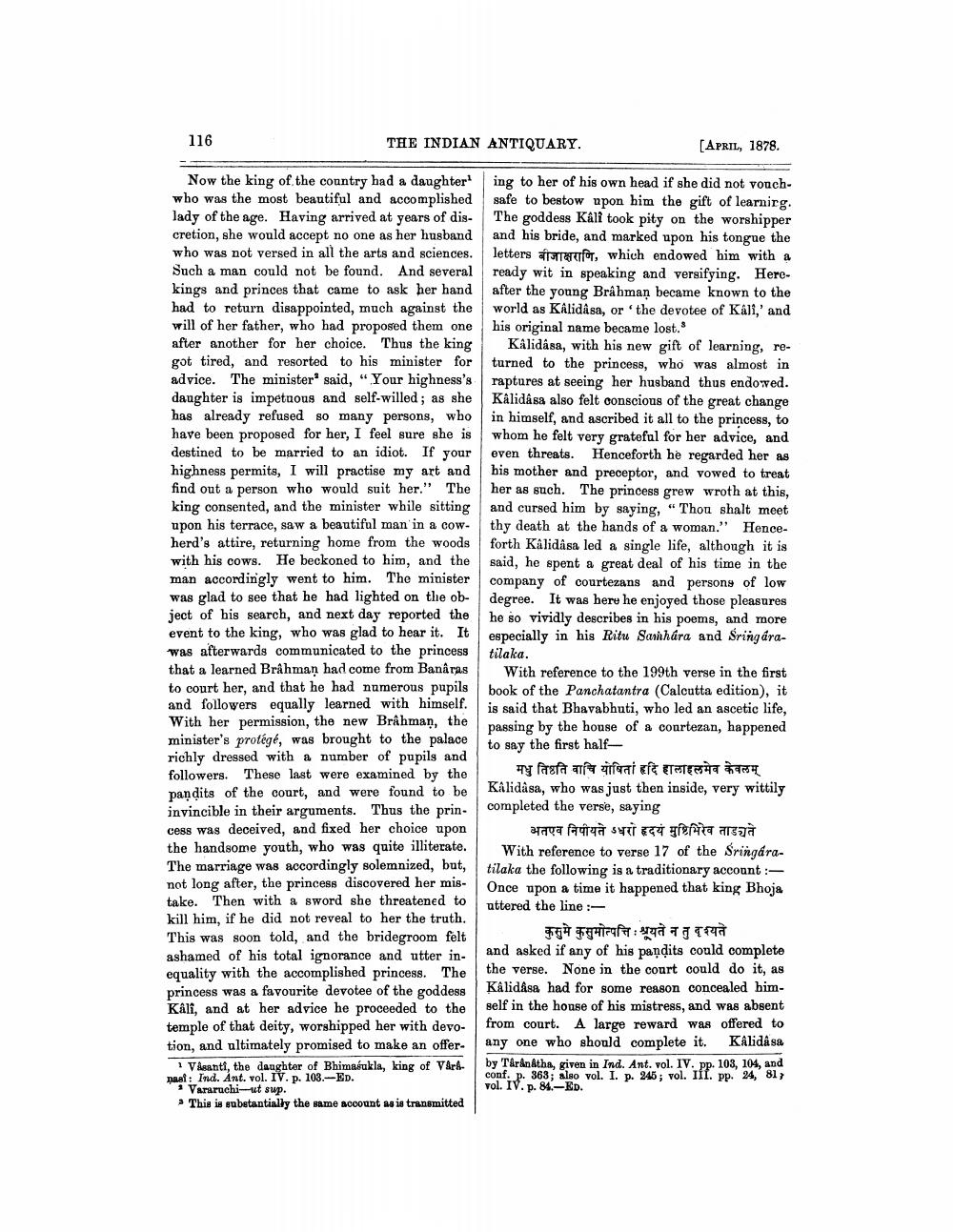________________
116
THE INDIAN ANTIQUARY.
[APRIL, 1878.
Now the king of the country had a daughter who was the most beautiful and accomplished lady of the age. Having arrived at years of dis. cretion, she would accept no one as her husband who was not versed in all the arts and sciences. Such a man could not be found. And several kings and princes that came to ask her hand had to return disappointed, much against the will of her father, who had proposed them one after another for her choice. Thus the king got tired, and resorted to his minister for advice. The minister said, "Your highness's daughter is impetuous and self-willed; as she has already refused so many persons, who have been proposed for her, I feel sure she is destined to be married to an idiot. If your highness permits, I will practise my art and find out a person who would suit her." The king consented, and the minister while sitting upon his terrace, saw a beautiful man in a cow. herd's attire, returning home from the woods with his cows. He beckoned to him, and the man accordingly went to him. The minister was glad to see that he had lighted on the object of his search, and next day reported the event to the king, who was glad to hear it. It was afterwards communicated to the princess that a learned Brâhman had come from Banaras to court her, and that he had numerous pupils and followers equally learned with himself. With her permission, the new Brahman, the minister's protégé, was brought to the palace richly dressed with a number of pupils and followers. These last were examined by the pandits of the court, and were found to be invincible in their arguments. Thus the princess was deceived, and fixed her choice upon the handsome youth, who was quite illiterate. The marriage was accordingly solemnized, but, not long after, the princess discovered her mistake. Then with a sword she threatened to kill him, if he did not reveal to her the truth. This was soon told, and the bridegroom felt ashamed of his total ignorance and utter in equality with the accomplished princess. The princess was a favourite devotee of the goddess Kali, and at her advice he proceeded to the temple of that deity, worshipped her with devotion, and ultimately promised to make an offer.
1 V danti, the daughter of Bhimasukla, king of Vårsmaal: Ind. Ant. vol. IV. p. 103.-ED.
- Vararuchiut sup. → This is substantially the same account as is transmitted
ing to her of his own head if she did not vouchsafe to bestow upon him the gift of learning. The goddess Kali took pity on the worshipper and his bride, and marked upon his tongue the letters aftfor, which endowed him with a ready wit in speaking and versifying. Hereafter the young Brahman became known to the world as Kalidasa, or the devotee of Kali,' and his original name became lost.
Kalidasa, with his new gift of learning, returned to the princess, who was almost in raptures at seeing her husband thus endowed. Kalidasa also felt conscious of the great change in himself, and ascribed it all to the princess, to whom he felt very grateful for her advice, and even threats. Henceforth he regarded her as his mother and preceptor, and vowed to treat her as such. The princess grew wroth at this, and cursed him by saving. "Thon shalt maat thy death at the hands of a woman." Henceforth Kalidasa led a single life, although it is said, he spent a great deal of his time in the company of courtezans and persons of low company of courtezane degree. It was here he enjoyed those pleasures he so vividly describes in his poems, and more especially in his Ritu Sannhara and Sringáratilaka.
With reference to the 199th verse in the first book of the Panchatantra (Calcutta edition), it is said that Bhavabhuti, who led an ascetic life, passing by the house of a courtezan, happened to say the first half
मधु तिष्ठति वाचि योषितां हृदि हालाहलमेव केवलम् Kalidasa, who was just then inside, very wittily completed the verse, saying
अतएव निपीयते ऽधरो हृदयं मुष्टिभिरेव ताड्यते With reference to verse 17 of the Sringaratilaka the following is a traditionary account :Once upon a time it happened that king Bhoja attered the line :
- कुसुमे कुसुमोत्पत्ति श्रूयते न तु दृश्यते and asked if any of his pandits could complete the verse. None in the court could do it, as Kalidasa had for some reason concealed himself in the house of his mistress, and was absent from court. A large reward was offered to any one who should complete it. KAlida sa by Táránátha, given in Ind. Ant. vol. IV. pp. 103, 104, and conf. p. 363; also vol. I. p. 245; vol. IIl. pp. 24, 817 vol. IV. p. 84.-ED.




